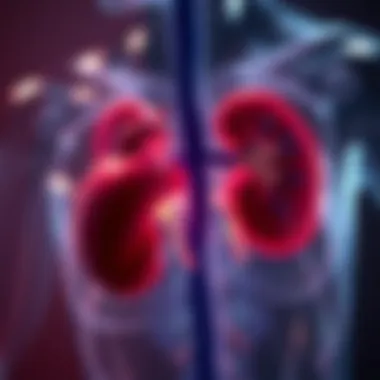Heart Failure and Kidney Disease: Interconnected Prognosis


Intro
The intricate web of interactions between heart failure and kidney disease presents a significant challenge in the realm of healthcare. Each condition can exacerbate the other, leading to a cascade of health issues that often complicates patient management and treatment. As both heart failure and kidney disease emerge as critical public health concerns, understanding their interrelationship becomes essential in improving patient outcomes.
Recognizing the interconnectivity between these two systems is not just an academic exercise; it’s crucial for devising effective therapeutic strategies. The heart and kidneys share a bi-directional relationship where dysfunction in one can precipitate failures in the other, leading to worsened patient prognosis. But what are the underlying mechanisms at play?
This guide will illuminate the pathways linking heart failure and renal impairment, dive into the associated clinical risk factors, and examine diagnostic challenges. It will also review current therapeutic approaches, the socio-economic implications of these intertwined diseases, and forward-looking research directions. A thorough understanding of these interrelations can shape new paradigms in treating patients who face the dual burden of heart failure and kidney disease.
Preamble to Heart Failure and Kidney Disease
The interplay between heart failure and kidney disease is a pressing issue in the realm of chronic illness. Understanding this interrelationship is crucial for enhancing patient prognosis and tailoring effective treatment strategies. Given that both conditions share common risk factors and pathophysiological mechanisms, it becomes increasingly important to examine their co-occurrence more closely. Moreover, heart failure can lead to kidney impairment, just as kidney disease can exacerbate heart conditions, creating a vicious cycle that complicates patient care.
When we look into heart failure, we see a condition where the heart struggles to pump blood effectively, which can lead to various systemic issues. Meanwhile, kidney disease, characterized by reduced kidney function, poses its own set of complications, not just for the kidneys but also for the cardiovascular system. The heart and kidneys are interconnected organs; thus, understanding how they influence each other is paramount for healthcare providers.
The significance of discussing these conditions can’t be overstated. Many patients grapple with both heart failure and kidney disease, resulting in poorer outcomes, increased hospitalizations, and significant treatment challenges. By diving deep into this topic, this article aims to highlight key elements of their interactions, benefits of a multidisciplinary approach in managing patients, and considerations for improving overall health management practices. This insight is not just academic – it's fundamental for clinicians, researchers, and healthcare strategists who seek to navigate the complexities of chronic disease management.
"Our understanding of cardiovascular and renal diseases must shift from treating them as separate entities, to recognizing the bidirectional relationship that exists between them."
In pursuing this knowledge, we aim to fortify healthcare systems and empower patients through education and informed decisions about their health. Knowing how heart failure and kidney disease are intertwined presents a great opportunity for healthcare professionals to effect tangible change in patient prognosis.
It is essential for professionals in the field to be aware of how these conditions affect one another at multiple levels. This understanding will enhance diagnostic accuracy, improve treatment adherence, and ultimately lead to better health outcomes in our patients.
Pathophysiological Mechanisms
The exploration of pathophysiological mechanisms is crucial in understanding the intricate link between heart failure and kidney disease. These mechanisms elucidate how dysfunction in one organ can spill over to impact the other, creating a cycle of deterioration that often complicates patient prognosis. Recognizing these interactions sheds light on potential therapeutic targets and highlights the urgency for integrated care approaches.
The Heart-Kidney Interaction
The relationship between the heart and kidneys can be described as a delicate dance; when one partner falters, the other often follows suit. Heart failure leads to reduced cardiac output, ultimately triggering renal hypoperfusion. This condition compromises the kidneys' ability to filter waste, resulting in fluid retention and electrolyte imbalances. Conversely, renal impairment has the capacity to exacerbate heart failure by increasing fluid overload and maintaining hypertension, leading to further strain on the heart.
"The heart and kidneys share a mutual dependency that complicates treatment and underscores the need for holistic management of patients."
Furthermore, the renal system plays a key role in modulating blood volume and pressure through the renin-angiotensin-aldosterone system (RAAS). An overactive RAAS in response to heart failure can lead to harmful levels of fluid retention, perpetuating a cycle that can escalate both heart and kidney dysfunction.
Neurohormonal Activation
Neurohormonal activation is another cornerstone of the interaction between heart failure and kidney disease. In heart failure, the body compensates for diminished cardiac output with increased activity of neurohormonal systems including the sympathetic nervous system, RAAS, and anti-diuretic hormone (ADH). Elevated levels of catecholamines and angiotensin II can lead to vasoconstriction, further reducing renal perfusion and worsening kidney function.
This abnormal activation not only hinders renal blood flow but also promotes inflammatory pathways and contributes to the progression of heart failure. For instance, increased levels of catecholamines can induce renal vasoconstriction, counteracting the body’s attempts to maintain adequate renal perfusion.
Additionally, it’s essential to consider how these neurohormonal changes might impair the regulatory functions of the kidneys, further contributing to a decline in both cardiac and renal health.
Inflammation and Oxidative Stress


The roles of inflammation and oxidative stress in the heart-kidney axis cannot be overlooked. Both conditions can create a hostile environment for cellular function, driving the progression of heart failure and renal impairment. In heart failure, systemic inflammation may arise due to increased cytokine production, which is then compounded by renal dysfunction, creating a feedback loop.
Oxidative stress, characterized by an imbalance between reactive oxygen species and antioxidants, further aggravates tissue damage in both organ systems. Patients exhibiting elevated markers of oxidative stress often see a corresponding detriment in their cardiovascular and renal function.
Addressing inflammation and oxidative stress thus represents a therapeutic avenue that could benefit patients suffering from both heart failure and kidney disease. Treatment strategies aimed at reducing inflammation might not only alleviate symptoms but also potentially delay disease progression.
By parsing through the complexities of these pathophysiological mechanisms, it becomes clear how intertwined heart failure and kidney disease are—serving as this interdependence's most significant indicator for patient prognosis.
Clinical Implications
When delving into the intricacies of heart failure and kidney disease, understanding their clinical implications is crucial. The interplay between these conditions can significantly shape the prognosis for patients, making it an essential topic for practitioners, researchers, and students alike. The implications are manifold, affecting diagnostic practices, treatment strategies, and ultimately patient outcomes. Here, we outline some of the critical aspects of these implications.
Diagnosis Challenges
Diagnosing heart failure and kidney disease often presents a real conundrum for healthcare providers. Symptoms of both conditions can overlap, leading to potential misdiagnosis or delayed treatment. For instance, shortness of breath, fatigue, and fluid retention are common in both heart failure and kidney impairments, which complicates differentiation. This overlapping symptomatology may result in a scenario where one condition exacerbates the other without accurate identification.
Moreover, diagnostic tools, such as echocardiograms and blood tests, may show altered results due to the presence of one condition masking the other. Clinicians must be astute in their assessment, often relying on a combination of diagnostic imaging and a thorough patient history.
A few pertinent points to consider:
- Renal function tests can be misleading, as elevated creatinine levels may be attributed to heart failure, while cardiac biomarkers like BNP (B-type natriuretic peptide) may be elevated in renal disease.
- Comorbidities such as diabetes and hypertension can further blur the lines, necessitating a careful, nuanced approach.
Prognostic Factors
Prognostic factors linking heart failure and kidney disease play a pivotal role in shaping treatment and management strategies. The presence of both conditions has been shown to worsen outcomes significantly. Understanding these factors not only aids in anticipating disease progression but also guides clinicians in making informed decisions about interventions.
Research indicates that when kidney function declines, the prognosis for heart failure patients becomes increasingly serious. A notable aspect is the ‘cardiorenal syndrome’, where heart failure directly affects kidney function and vice versa. This concept underscores the importance of monitoring renal function in heart failure patients and keeping a close eye on heart health in those with kidney disease.
Some key prognostic considerations include:
- Glomerular filtration rate (GFR): A decrease in GFR can signify worsening heart failure and indicates potential treatment complications.
- Hospitalization rates: Frequent admissions due to heart or kidney issues can indicate a poor prognosis, highlighting the need for careful management.
Symptoms Overlap
Symptoms of heart failure and kidney disease often merge, presenting further challenges for diagnosis and management. Both diseases share symptoms like edema, fatigue, and frequent urination, leading to potential confusion for both patients and healthcare providers. Understanding these overlaps is crucial for effective charting of diagnostic pathways and treatment options.
A typical patient may present with:
- Fluid retention: Which could result from heart failure due to decreased cardiac output or kidney disease due to impaired nephron function.
- Fatigue: Both conditions can lead to reduced stamina, making it difficult to discern the root cause without thorough investigation.
Recognizing this overlap allows for tailored management strategies. For example, addressing fluid status is vital, as diuretics may assist with both conditions, but require careful titration to avoid kidney injury.
"The intricate balance of heart and kidney health cannot be overemphasized; understanding their shared symptoms leads to better outcomes."
In summary, the clinical implications of heart failure and kidney disease require a comprehensive approach to diagnosis and management. With careful consideration of diagnosis challenges, prognostic factors, and symptom overlap, health professionals can markedly improve patient care and enhance understanding of this dual affliction.


Therapeutic Approaches
Managing heart failure alongside kidney disease is complex, yet crucial. Understanding the therapeutic approaches available is essential for improving patient outcomes. This section will delve into various strategies—pharmacological treatments, non-pharmacological strategies, and renal replacement therapies—highlighting their importance, benefits, and considerations.
Pharmacological Treatments
Pharmacological interventions remain a cornerstone in treating patients with both heart failure and kidney disease. Medications such as ACE inhibitors, angiotensin receptor blockers, and diuretics are often prescribed. These drugs help manage heart failure symptoms but also have a significant impact on renal function.
- Diuretics: They encourage the excretion of excess fluid, alleviating symptoms like edema and shortness of breath. However, in patients with kidney disease, careful monitoring is necessary to avoid dehydration and electrolyte imbalances.
- ACE Inhibitors: These drugs can lower blood pressure, improving heart function and offering renal protection. However, starting doses often need adjustment to prevent acute renal injury.
- Beta-blockers: They improve heart function over time but require monitoring in patients with renal impairment, in case of adverse effects.
In addition to these traditional treatments, new medications are continually being researched. The efficacy and safety of such therapies in coexisting conditions need thorough exploration, guiding healthcare providers in making informed decisions.
Non-Pharmacological Strategies
Alongside medications, non-pharmacological approaches play a vital role in managing heart failure and kidney disease. These strategies include dietary modifications, exercise regimens, and patient education.
- Dietary Modifications: Reducing sodium intake can help manage fluid retention, while adhering to a kidney-friendly diet may reduce the burden on the kidneys. Incorporating foods rich in potassium become critical to maintain heart health.
- Exercise Regimens: Tailored exercise programs can enhance quality of life, improve functional capacity, and potentially slow disease progression. However, caution is required to customize intensity levels appropriate to each patient's capacity.
- Patient Education: Informing patients about their conditions and treatment options fosters adherence to prescribed therapies. Ensuring understanding around signs of worsening symptoms can lead to earlier interventions, a crucial aspect in this intertwined pathology.
Renal Replacement Therapies
As heart and kidney functions decline, renal replacement therapies (RRT) become necessary for some patients. These therapies, which include dialysis and kidney transplantation, have profound implications for managing dual pathology.
- Dialysis: This can be either hemodialysis or peritoneal dialysis. Paradoxically, while dialysis can alleviate kidney function issues, it may also complicate heart failure management due to fluid shifts, electrolyte changes, and other stressors.
- Kidney Transplantation: This offers the potential for improved quality of life and better outcomes compared to chronic dialysis. It is, nevertheless, paramount to assess cardiac health pre-transplant, as cardiovascular issues can significantly impact transplant success.
In summary, a comprehensive therapeutic approach, leveraging both pharmacological and non-pharmacological strategies, is critical in the management of patients facing the dual challenge of heart failure and kidney disease. These efforts can bridge the gap between managing symptoms and improving the overall prognosis in this vulnerable population.
Socio-Economic Factors
Understanding the intertwining relationship between heart failure and kidney disease goes far beyond medical treatments and diagnostic criteria. The socio-economic factors play a crucial role in determining patient outcomes and the effectiveness of healthcare systems. These factors encompass a broad spectrum, including income levels, education, and social support networks. Addressing these elements is essential for crafting effective interventions and policies that can improve the management of these conditions.
Impact on Healthcare Systems
The burden of coexisting heart failure and kidney disease significantly affects healthcare systems. As both conditions often require intensive management and frequent monitoring, their high prevalence leads to increased healthcare costs.
- Resource Allocation: Health care providers must allocate resources efficiently to handle the demands of patients with both conditions. This can mean prioritizing certain treatments or investing in specialized staff who understand the complexities of both diseases.
- Increased Hospitalization: Patients with heart and kidney issues tend to have higher rates of emergency room visits and hospital admissions. This places additional strain on healthcare systems already operating at near capacity.
- Economic Burden on Patients: The out-of-pocket expenses for these patients can range widely. Compounded by lost workdays and the need for ongoing care, this economic strain can have detrimental effects on their overall health.
"When we talk about health, we can't ignore the economic factors. They shape access, quality of care, and ultimately outcomes for patients with chronic diseases."
Patient Compliance and Education
For patients suffering from heart failure and kidney disease, compliance with treatment is paramount. However, socio-economic factors can significantly hinder their ability to adhere to medical advice.
- Understanding Instructions: Many patients may struggle with understanding complex medical jargon or treatment regimens if they are from lower educational backgrounds. Providing education in simple, clear language can foster better compliance.
- Financial Strain: If a person is juggling multiple prescriptions or therapies but can barely make ends meet, it’s likely they might skip doses or avoid necessary treatments altogether just to save money.
- Support Systems: Patients with strong social networks tend to have better health outcomes. They benefit from emotional support, as well as practical help with transportation and managing medications, which can sometimes be taken for granted in discussions of compliance.
Access to Care


Access to care symbolizes another critical socio-economic factor that influences outcomes for heart failure and kidney disease patients. Unfortunately, disparities exist based on geographic, economic, and demographic parameters.
- Geographic Barriers: Individuals living in rural areas may have to travel significant distances to reach specialized nephrologists or cardiologists. This can deter them from seeking necessary care.
- Lack of Insurance: Many individuals with heart failure and kidney disease might not have adequate insurance coverage. This leads to delayed treatment or avoidance of care altogether due to cost concerns.
- Cultural Sensitivity: Different cultural backgrounds may influence how patients perceive illness and care. Tailoring healthcare delivery to respect cultural nuances can improve access and understanding.
In summary, socio-economic factors largely dictate the pathways patients navigate within healthcare systems. Recognizing these influences provides essential insight into improving patient management for heart failure and kidney disease. Whether through education, better resource allocation, or improving access to care, addressing socio-economic elements is indispensable in the fight against these interrelated conditions.
Research and Future Directions
Research into the intricate duo of heart failure and kidney disease is gaining momentum. This is not merely a reaction to rising prevalence rates; it’s about understanding how these two diseases play off each other in a way that complicates patient care and worsen outcomes. As we progress, focusing on research and future directions offers a beacon of hope that could illuminate pathways to improved patient care and management.
Emerging Biomarkers
A key focus area is the development of emerging biomarkers, which represent a promising frontier in tracking disease progression and response to therapy. Unlike traditional markers, these novel indicators can provide insights into the biological underpinnings of heart and kidney interactions. For instance, biomarkers like cardiac troponins and natriuretic peptides can signal heart stress while also hinting at renal dysfunction. The intersection of these markers can help clinicians identify at-risk patients earlier, ultimately leading to timely interventions.
"Incorporating biomarkers into clinical practice could transform how we manage patients with heart failure and kidney disease, bridging gaps in current understanding and treatment strategies."
But, research must also delve into identifying biomarkers that can predict outcomes in patients co-diagnosed with heart failure and kidney disease. This runs the risk of creating a plethora of potentially useful markers, though. Care must be taken to differentiate between clinical utility and statistical significance when developing these biomarkers into routine diagnostic tools.
Innovative Therapies
Next, there's a whole universe of innovative therapies waiting to be explored. While traditional treatments have made a difference, they often fail to address the unique needs of patients suffering from both heart and kidney diseases. Therefore, integrating therapies that consider the heart-kidney axis is essential.
For example, SGLT2 inhibitors, a class of medications primarily used for diabetes management, have shown promise in reducing hospitalization rates for heart failure patients. These agents may also have beneficial effects on kidney outcomes, thus representing a dual-action approach. Going beyond, the development of combined pharmacotherapies could provide synergistic benefits that target both organs simultaneously.
Improving Patient Outcomes
At the end of the day, improving patient outcomes remains the ultimate goal of research in this area. More than just a numbers game, addressing the collective burden on individuals with both heart failure and kidney disease involves a multi-dimensional approach. Interdisciplinary care teams engaging cardiologists, nephrologists, and primary care providers are crucial.
Establishing best-practice protocols that integrate research findings can help ensure patients receive care based on the most current and relevant evidence. Furthermore, involving patients in their own care pathways—through education and shared decision-making—could foster adherence to treatment plans and promote better health outcomes.
In summary, as emerging biomarkers, innovative therapies, and a focus on patient outcomes work in tandem, the path forward in understanding the complexities of heart failure and kidney disease can become clearer. The ongoing journey in research not only sheds light on these comorbid conditions but paves the way for new hope and enhanced quality of life for affected individuals.
End
In examining the intricate link between heart failure and kidney disease, it becomes increasingly evident that understanding these conditions is not merely an academic pursuit; it is essential for fostering better patient outcomes. The interrelationship impacts patients' lives in profound ways, necessitating a thoughtful approach that encompasses diagnosis, treatment, and ongoing management.
Summary of Key Findings
The article has highlighted several key findings that elucidate the complexity of coexisting heart failure and kidney disease. First, the heart and kidneys impact one another, often exacerbating the overall clinical picture. The shared risk factors, including hypertension and diabetes, amplify the dangers posed by these two conditions. Furthermore, prognosis is significantly tied to the stage of kidney impairment, underlining the necessity for a thorough evaluation and consistent monitoring of both organs as one influences the other. The summary emphasizes that appropriate therapeutic strategies can reduce hospitalizations and improve quality of life, allowing for a more tailored approach to patient care.
Importance of Interdisciplinary Approaches
An interdisciplinary approach is invaluable in managing these intertwined conditions. Different specialties must come together—cardiologists, nephrologists, primary care providers, and nutritionists—as each discipline brings vital insights that can significantly influence treatment protocols. Collaborating within a framework that prioritizes shared insights can lead to more comprehensive care plans. For instance, it may involve adjusting heart failure medications based on kidney function or vice versa. This collaboration not only enhances the patient experience but also builds a network of support that addresses multiple health concerns simultaneously, thereby improving overall efficacy in treatment.
Call for Continued Research
As we stand on the brink of greater understanding, there remains a pressing need for continued research in this field. New biomarkers to predict prognosis, innovative therapeutic approaches, and strategies to improve adherence to treatment must be pursued. Researchers should aim to uncover the underlying mechanisms that drive the heart-kidney interaction, thus paving the way for more effective interventions. Future studies can guide clinical practice, foster awareness in healthcare systems, and ultimately contribute to a foundation that supports better management of these chronic diseases.
"In the world of medicine, one must always be ready to adjust the sails, for the winds of knowledge are ever-changing."
In summary, grappling with the complexities of heart failure and kidney disease not only informs treatment but also shapes the trajectory of patient care. The continued exploration of this relationship holds promise for improved health outcomes and an overall reduction in mortality associated with these conditions.















